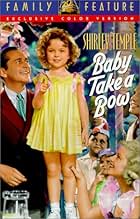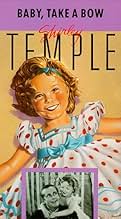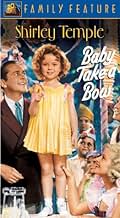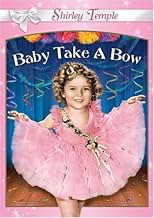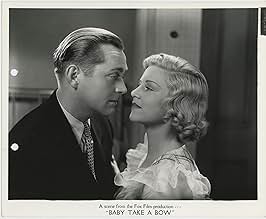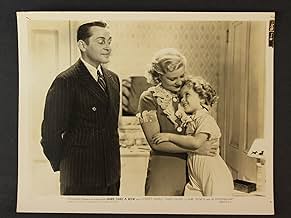Agrega una trama en tu idiomaEddie Ellison is an ex-con who spent time in Sing-Sing prison. Kay marries him as soon as he serves his time. Five years later, Eddie and his ex-convict buddy Larry, have both gone straight,... Leer todoEddie Ellison is an ex-con who spent time in Sing-Sing prison. Kay marries him as soon as he serves his time. Five years later, Eddie and his ex-convict buddy Larry, have both gone straight, and Eddie and Kay have a beautiful little daughter named Shirley. However, Welch has kept... Leer todoEddie Ellison is an ex-con who spent time in Sing-Sing prison. Kay marries him as soon as he serves his time. Five years later, Eddie and his ex-convict buddy Larry, have both gone straight, and Eddie and Kay have a beautiful little daughter named Shirley. However, Welch has kept a close eye on them for years. He believes in "once a criminal, always a criminal." When ... Leer todo
- Dirección
- Guionistas
- Elenco
- Ragpicker
- (sin créditos)
- Police Detective
- (sin créditos)
- Mrs. O'Brien
- (sin confirmar)
- (sin créditos)
- Detective Sergeant
- (sin créditos)
- Blair
- (sin créditos)
- Warden
- (sin créditos)
- Birthday Party Guest
- (sin créditos)
- Extra on Train
- (sin créditos)
Opiniones destacadas
The ten minute prologue introduces Kay (Claire Trevor) at the train station heading for Ossining to meet with the man she's going to marry. Eddie Ellison (James Dunn), a former crook, having served time in Sing Sing Prison, is being paroled four months early for good behavior. Welch (Alan Dinehart), the special investigator who caused Eddie's conviction to get Kay for himself, has followed Kay to the prison. Upon their meeting, Kay makes plans for she and Eddie to marry and honeymoon at Niagara Falls. As Flannigan (James Flavin) arrives with Larry Scott (Ray Walker) to serve a five year stretch, Scott, who takes an immediate liking towards both Kay and Eddie, and dislike towards Welch, does Eddie a good turn by socking Welch. Six years later, Eddie is seen working as a chauffeur for the wealthy Joseph Carson (Richard Tucker). He succeeds getting Cason to hire his friend, Larry, now out on parole with plans of marrying Jane (Dorothy Libaire), though both keep their prison history a secret. Also released from Sing Sing is "Trigger" Stone (Ralf Harolde), who, unlike Eddie and Larry, has no intentions of reforming. Eddie and Kay, blessed with a daughter, Shirley (Shirley Temple), make preparations for her upcoming birthday party to take place on the rooftop of their tenement apartment building. Trigger, who has stolen a pearl heckles from the Carson home, gives it to Shirley, thinking it as her birthday present. Due to the robbery and the discovery of Eddie and Scott's prison records through Welch, Carson is forced to have dismiss them from his employ. Learning that Trigger is the culprit, Eddie and Larry have a hard time proving their innocence, especially with the heckles in their possession and Welch hot on their tail.
Not quite the formula Shirley Temple production, BABY TAKE A BOW, does offer her, in ballet dress, a song and dance number accompanied by James Dunn singing "On Account of I Love You" (by Buddy Green and Sammy Stept). A good song underscored during its opening and closing credits, but something that simply didn't catch on as did Temple's other hit songs of 1934, "Baby Take a Bow" and "On the Good Ship Lollipop." Temple and Dunn registered so well together that they were reunited for the last time in their best collaboration, BRIGHT EYES (1934). Others in the cast include Olive Tell (Mrs. Carson); Samuel S. Hinds (The Warden); Mary Gordon (Mrs. O'Brien); and Guy Usher (McLane, Captain of Detectives).
1934 was a busy year for Shirley Temple, having more film releases than any other year. As for BABY TAKE A BOW, it has become unfamiliar and least known to modern audiences due to its unavailability, having never become part of the "Shirley Temple Theater/ Playhouse" on commercial television during the 1960s and 70s. Not until the mid to late 1980s has BABY TAKE A BOW surfaced, becoming a welcome addition to the Shirley Temple/20th Fox movies placed on cassette by Playhouse Video and distribution on cable television (Disney Channel (early 1990s), American Movie Classics (1996-2001), Fox Movie Channel) and later on DVD either in colorized or original black and white formats.
Regardless of BABY TAKE A BOW's reputation as being one of Temple's lesser efforts, due to plot focusing more on adults (especially the annoying Dinehart) than to her character, along with some gun battles not used in her latter films, overall, a welcome addition plus a look back into the early career of the biggest, littlest star, Shirley Temple. Baby, take a bow! (***)
Here's what this is. It part prison picture in tone. Prison movies were a staple in that era because the system was considered to be inherently unjust, and good men could easily be sent to the bighouse, with cops usually depicted as incompetent or cruel.
Its part adventure/comedy, with stolen jewels, hidden and with open slapstick toward the end.
And it partly a show movie with a song and dance number, apparently recreated from a previous film.
The film itself is dull and cheap, but the idea behind it is wild. A pudgy 5 year old can carry a film?
Ted's Evaluation -- 1 of 3: You can find something better to do with this part of your life.
The film begins with Eddie (James Dunn) getting out of prison and marrying his girlfriend, Kay (Claire Trevor). He then gets a job working as a chauffeur and several years pass. Now they STILL are amazingly happy and have the world's most perfect child, Shirley (Shirley Temple). But, into their idyllic world comes a serious problem--there is a jewel robbery and when their employer finds out that Eddie and his friend, Larry, both had been to prison, they are fired. A dogged cop, Welch, is convinced one or both of these men did it and he spends the rest of the film trying to return them to Sing Sing. Are they innocent? And, if so, who did it and how will they prove it? And, more importantly, will little Shirley's heart be broken?!
The film has a couple minor problems--though neither harms the film significantly. Welch is a bit one-dimensional and annoying--perhaps too annoying. Also, there is a song near the beginning that Shirley and James Dunn sing--and it's so sickeningly sweet that diabetics in the audience are encouraged to stop the film to check their blood sugar! However, the film uses a young Shirley well. She is awfully young and so she is given a part that is mostly comic relief--and so the plot itself does not rest on her small shoulders--a good decision in hindsight. And, despite the schmaltz, the film is enjoyable and fun.
First, she isn't the main attraction. James Dunn and Claire Trevor are the stars. This was Temple's first feature film but she was the third, fourth or even fifth person in here, screen time-wise. The powers-that-be must have seen the bright future she had, though, and made two more films with her in the same year (1934), beginning with "Bright Eyes," and she never looked back, becoming a huge box-office attraction on her own. This particular film featured a lot more drama and crime element and that was no longer to be, too, as light-hearted singing and dancing was the ticket...not this sort of fare.
"This sort of fare" meant a climactic scene in which Shirley is kidnapped, carried to a rooftop kicking and screaming for help while her father is pursuing and her mother is frantically looking on, screaming herself. Hey, that's not a "Shirley Temple film" as we know it.
That doesn't mean this movie is all dark or doesn't offer some typically-cute Temple moments: it does. There is a great song-and-dance number with Dunn, who was good singer in his own right, and a solo earlier in the film. However, the rest is drama about Dunn and his pal trying to go straight after a prison sentence and a few guys who don't want to see that or believe it. Overall, it's a fairly interesting movie, although very dated in spots, but it's not the kind of thing Temple fans are accustomed to seeing....so be forewarned, if you haven't seen this.
Except for the presence of Shirley Temple, most likely this film would long ago have slipped into complete obscurity. James Dunn, Claire Trevor & the rest of the adult performers do their best with the rather tired material, but it is Shirley that one remembers. She is a darling & lights up her scenes with her sparkling personality. Everything else fades away...
¿Sabías que…?
- TriviaUpon its 1934 release, this film was banned in Nazi Germany for its depiction of gangsterism and gun play.
- ErroresAt the end scene, after Trigger has been caught, Eddie climbs over the low wall to join his family. A few moments later, he is back behind the wall again.
- Citas
Kay 'Funny Face' Ellison: Two tickets to Niagara Falls, please.
Train Teller: Oh. Congratulations, ma'am. What train?
Kay 'Funny Face' Ellison: The 9:20, and I want to stop off at Ossining.
Train Teller: Ossining? You mean, Sing-Sing?
Kay 'Funny Face' Ellison: No, I mean Ossining.
- Versiones alternativasIn 2005 a second colorized version was prepared by Legend Films, replacing the old version previously syndicated to television and released on VHS.
- ConexionesFeatured in The Biggest Little Star of the 30's (1976)
- Bandas sonorasOn Account-a I Love You
(1934) (uncredited)
Music by Sam H. Stept
Lyrics by Bud Green
Sung and Danced by Shirley Temple and James Dunn
Selecciones populares
- How long is Baby, Take a Bow?Con tecnología de Alexa
Detalles
- Tiempo de ejecución1 hora 16 minutos
- Color
- Relación de aspecto
- 1.37 : 1
Contribuir a esta página


